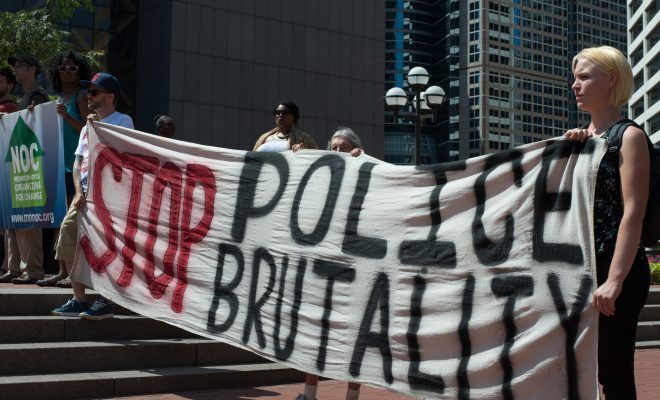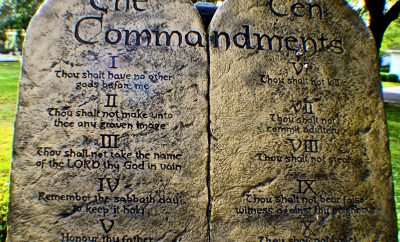 Image courtesy of [Fibonacci Blue via Flickr]
Image courtesy of [Fibonacci Blue via Flickr]
Law
Police Brutality and the Mentally Ill in America
Mental illness is something that the American justice system has been dealing with for decades; particularly how to handle suspects suffering from it, how to determine who is mentally ill, and what are the best practices for apprehending, sentencing, and holding those people.
Mental illnesses are defined medically as “disorders that affect your mood, thinking, and behavior. Examples of mental illness include depression, anxiety disorders, schizophrenia, eating disorders, and addictive behaviors.” There’s no easy way to define a mental illness, and certain diseases don’t affect everyone in the same ways. That ambiguity is where many problems stem from–how should police deal with those who have mental illnesses?
Accusations of Police Brutality Against the Mentally Ill
The United Nations
The United States had to stand before the United Nations in Geneva last week to defend its human rights record. While this is a routine endeavor, it is still something that reflects badly upon the country and its leaders. There were a lot of topics to cover, but the most prevalent was police brutality. A staggering 120 countries were there to offer recommendations, making it one of the best-attended hearings in the history of the UN, and each country was given 65 seconds to speak. Countries from every corner of the globe stressed that police brutality and discrimination has to end. One of the main things that the discussions centered upon was the way that police officers treat mentally ill suspects.
Human Rights Watch Report
That wasn’t the end of the criticism over the way that the United States treats people with mental illnesses in the justice system. Also last week, Human Rights Watch produced a report that chronicled the daily lives of mentally ill inmates in America’s prisons, showing that the issues in the justice system extend far beyond police brutality. The report, coming in at a staggering 127 pages, is packed with stories of neglect, abuse, improper medical care, corporal punishment, and unnecessary solitary confinement.
Some of the stories reported were particularly troubling. There is one incident about a man with schizophrenia who lunged for a police officer. As punishment, they strapped him to a chair, put a mask over his face, and sprayed pepper spray directly into his face under the mask. There are stories of many inmates who were found dead or unconscious laying in pools of their own urine, vomit, blood, and feces.
One of the most harrowing stories is what happened to 50-year-old Darren Rainey, who, according to the report, had a “diagnosis of schizophrenia, [and] was housed in the inpatient mental health unit at Florida’s Dade Correctional Institution while serving two years on a cocaine charge.” His mental health caused him, at times, to smear feces on himself. The correctional officers would then have to transport him to the showers and help him clean up. The report alleges that the officers took Rainey to a broken shower that could be turned to scalding. He could not control the water nor leave the shower as the police closed the door. He stayed in the scalding shower for nearly two hours. When the police finally opened the door, they found him unresponsive and without a pulse. When they moved him, it was discovered that “he had burns over 90 percent of his body, and his skin was hot/warm to the touch and slipped off when touched.” There has not yet been a medical report on his death and the police investigation is ongoing.
The Treatment Advocacy Center estimates that there are about 360,000 prisoners in 5,100 American jails and prisons with serious mental illnesses–particularly schizophrenia, bipolar disorder, and severe depression. That statistic has caused many people to wonder what exactly are the “rules” that the police have to follow when dealing with the mentally ill?
Should the mentally ill even be incarcerated?
There have been many discussions about exactly what rights a person with a mental illness has when he is arrested. Of course, there should be differences depending on the type and severity of the mental illness. But as a general rule, most protocols haven’t been broken up that way–instead, there are blanket policies for everyone, and they often deal more with procedures that need to be followed after the arrest. There are many allegations that the police act too harshly when dealing with suspects who have mental illnesses.
Some states have taken their own unique approaches. California, for example, has thoroughly questioned whether or not the Americans with Disabilities Act protects mentally ill suspects from being arrested and brought into the traditional justice system. That notion stems from a situation where a mentally ill woman, Theresa Sheehan, was shot five times after she waved a knife at police officers–police officers who knew she was mentally ill, as she had a history of mental breaks and was in a halfway house. The case was recently investigated by the United States Supreme Court.
In light of that case, Ron Honberg, Director of Policy and Legal Affairs at the National Alliance for Mental Illness (NAMI), said that law enforcement officers “have become first responders to people in psychiatric crisis,” but that “oftentimes, their traditional academy training doesn’t really teach police how to respond to such crisis.”
The Supreme Court found that the police were “immune” in the Sheehan case, stating:
A federal district court sided with the police, ruling that it would be unreasonable to ask officers trying to detain a violent, mentally disabled person to comply with the ADA before protecting themselves and others. But the 9th U.S. Circuit Court of Appeals said a jury should decide whether it was reasonable for the officers to use less confrontational tactics.
Testing and Treatment
So what are the policies once someone who may have a mental illness is actually arrested? If the police arrest someone whom they suspect is mentally ill, they are supposed to have them checked out by a mental health professional, which will typically result in a 24-to-72-hour stay in a mental health facility.
Family members of the mentally ill person can also ask for a police transport to the hospital if that was not an option during the arrest. This is sometimes called a “5150 hold.”
Certain states have stipulations against arrests of the mentally ill. A New York State guide for lawyers explains:
Under Criminal Procedure Law section 730, a judge who has reason to believe that a criminal defendant may be ‘incapacitated’ must order that the defendant undergo a psychiatric examination. ‘Incapacitated’ in this context means that because of mental disease or defect, the defendant is unable to understand the proceedings against him or assist in his own defense. A ‘730 exam,’ as such exams are referred to, can be requested by a defense attorney or an assistant district attorney, or may be ordered upon the judge’s own initiative.
Other states have similar stipulations. Denver has seen 11 deaths in 2015 after police have been called to the site of a mental breakdown–including one where a veteran was wielding scissors. The state is looking at its training and laws, but also considering on-site questions and tests.
The Supreme Court of Michigan recently ruled in a case against police that they used force against a mentally ill inmate:
That the evidence provided by plaintiff, indicating that the police were inadequately trained in dealing with the mentally ill and using impact projectiles, is sufficient to survive summary judgment. Plaintiff’s expert, retired Captain Van Blaircom, who is former chief of police for the City of Bellevue, Washington, testified that the Defendant officers should have known that the manner in which they approached the decedent would escalate the confrontation. According to Van Blaircom, the officer’s treatment of the situation, combined with their statements that a mentally ill person should be treated as any other person, regardless of the situation, indicates that the police department’s training dealing with the mentally ill falls well below the reasonable standard of contemporary care.
Conclusion
Overall, there seems to be some movement toward reform for police brutality against the mentally ill, but there is still a lot of ground to be covered, and covered quickly before anyone else dies. Procedures need to be enacted to ensure that officers deal fairly and effectively with suspects who are dealing with a mental illness. It is only through developing those policies that we can ensure all Americans are treated humanely.
Resources
ABC News: High Court: Police Immune Over Arrest of Mentally Ill Woman
Human Rights Watch: Callous and Cruel
Guardian: Police Shooting of Mentally Ill Woman Reaches US Supreme Court
Urban Institute: The Processing and Treatment of Mentally Ill Persons in the Criminal Justice System
Urban Justice Center’s Mental Health Project: How to Help
Aljazeera America: US Cited for Police Violence, Racism in Scathing UN Review on Human Rights
Coloradoan: Supreme Court to Rule on Arrests of Mentally Ill
Mother Jones: There Are Ten Times More Mentally Ill People Behind Bars Than in State Hospitals
National Alliance on Mental Illness: A Guide to Mental Illness and the Criminal Justice System
National Institute of Corrections: Mental Illness in Corrections
Schizophrenia: How to Help a Mentally Ill Family Member Who Has Been Arrested
LA Times: L.A. Police Accused of Excessive Force in Arrest of Mentally Ill Man
Mental Illness Policy Org: Criminalization of Individuals with Severe Psychiatric Disorders








Comments